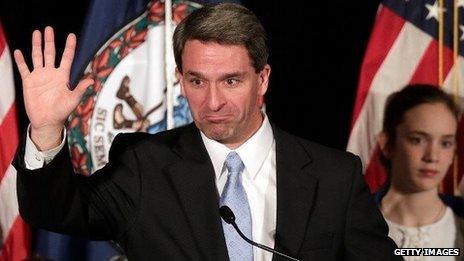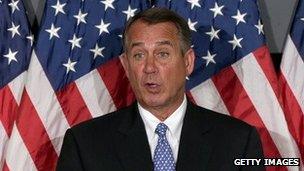Reports of Tea Party demise are greatly exaggerated
- Published
- comments

Virginia Republican candidate Ken Cuccinelli may have lost, but the Tea Party lives on
Something like a standard interpretation of last week's elections has now emerged: The country has taken a baby step to the left, the Tea Party wing of the Republican Party has been weakened, and Regular Republicans - pro-business and pro-establishment - are finally fighting back.
Here's the argument:
While centrist, even "moderate" Republican Governor Chris Christie romped to re-election in the Democratic state of New Jersey, libertarian poster boy Ken Cuccinelli lost the governor's race in conservative Virginia.
Further south in Alabama, the national business lobby coalesced behind a standard issue Republican running against a fire-breathing Tea Party man in a special House election - and won, reasserting the power of the Regular Republican Party. And in New York City, a very liberal Democrat, Bill de Blasio, was elected to succeed the independent, but formerly Republican, Michael Bloomberg.
No clear shift
I suspect these consensus conclusions are premature (dare I say they come from the echo chamber?).
Neither the results nor the exit polls show any tidal wave of new opposition to Tea Partyism - certainly not enough to discourage the true believers.
Columnist EJ Dionne declared in the Washington Post, external, "The centre of gravity in American politics moved left in Tuesday's off-year elections." A couple scattered elections, however, do not a trend make.
Sure, liberal New York City replaced the country's most liberal quasi-Republican with a liberal Democrat. Sure, a Democrat beat a Republican in a Southern gubernatorial race. But, to pick just one counter-example, Colorado voters defeated a well-funded and widely supported initiative to raise taxes to pay for an overhaul of the state's schools.
There just were not a lot of tea leaves in these elections. But there were interesting dimensions.
Black-white split
The difference in the black/white vote in all three of the big elections was as stark as can be.
In the exit polls of the Virginia governor's race, blacks picked the Democrat 90% to 8%; whites voted for the Republican, 56%-36%. In New Jersey, blacks voted for the Democrat 78%-21%; whites for the Republican by the reverse margin, 79%-21%. In the New York mayor's race, blacks voted for de Blasio (whose wife is black) 96%-3%.
My suspicion is that black voters feel a growing threat or hostility from the Republican Party, or at least from its Tea Party wing.

House Speaker John Boehner will still have to answer to the Tea Party
It isn't at all surprising the racial dimensions of politics have been exacerbated during the administration of America's first black president. The reverse would be far more surprising.
The Tea Party movement from the start has had to defend itself from accusations of racism. They are increasing in volume, however - allegations that can be heard on MSNBC most days.
And certainly the antipathy of a slice of white America to Obama is rabid. But polling, focus groups and anecdotal reporting can't get at the role of race in the Tea Party ethos very precisely or effectively. It is clear, however, black voters feel it.
Establishment still cowed
The counter-revolution of the GOP establishment against the Tea Party is old story and not yet a meaningful one.
Regardless of what the party elders hope, Republican leaders in Congress are still cowed by the revolutionaries. While polling shows the Tea Party - and the Republican Party - are increasingly unpopular with just about everyone who isn't in them, there hasn't yet been a revolution in the voting booths, and there wasn't one last week. Senate Minority Leader Mitch McConnell and especially Speaker of the House John Boehner will remain shackled until that happens.
Voters, remember, didn't take away the GOP majority in the House last year. Indeed, they sent a large and rambunctious squadron back to the Hill.
In the Virginia race last week, Cuccinelli didn't get clobbered as the polls predicted. It was fairly close. And even by the measure of Tea Party members of the House, Cuccinelli was extreme. He was far outspent by his opponent, but he made it a race. I don't see a counter-revolution brewing in Virginia. Nor in Alabama, where an even wilder Tea Partier waged a credible race against a veteran politician funded by national Republican interest groups.
2014 Outlook Cloudy
There were no clear omens for the 2014 midterm congressional elections in last week's vote.
Republicans will have to win every race where they have a prayer if they are going to capture the Senate. The odds are long.
The reverse is true of the House: the Democrats will need an anti-Republican tsunami to take back the House, and the wave hasn't formed yet.
If some currently unobserved weather event overcomes Republican primary voters and they oust Tea Party incumbents, then the House will indeed be very different even if the GOP retains control.
There are new political action committees trying to do that, with the blessing of many state party organisations and business groups. The primary season will be especially interesting and important next year.
Toxic Washington
Good men and women are still hard to find.
The political atmosphere in Congress is so toxic right now that both parties are having a hard time recruiting distinguished, well-known candidates to run, even for the Senate. Only a true political junkie would recognise more than a couple names running for the Senate next year, incumbents excepted. Gone are the days when all the top House members, former ambassadors and cabinet officers, big-time prosecutors and governors filled the Senate ballots.
Polls show that almost every profession is more trusted than being a member of Congress, hardly a beacon to public service for our best and brightest.